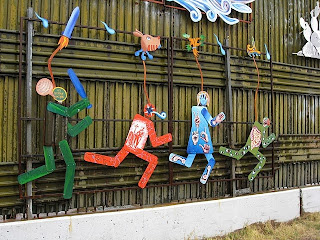
OPERATION STREAMLINE (Rachel Neuschatz)
Last Tuesday we went to the Federal Courthouse in Tucson to see Operation Streamline: special proceedings that bring federal criminal charges against anyone who has crossed into the U.S. without legal permission. A holdover from the Bush Administration's supposed "zero tolerance" border enforcement , Operation Streamline is hoping to get 70 people in court each week day (there were 62 the day we went), out of the 300-400 that cross through the Tucson Sector at this time of year (that number grows to 1000 in the summer; and this is keeping in mind that migration has slacked off significantly in the last few years). The prosecutor (we spoke to him after the proceedings) told us that their goal is 100 arrests and 100 people in court every day, but that that would never happen--the system was past capacity as is, with juvenile detention centers letting more and more people on parole to free up cells for the migrants serving their Streamline sentences, and public defenders meeting with clients in locked courtrooms because there are more defendants than holding cells.
There were, in fact, so many defendants that they had to use the jury box to seat them all. When we came in (the proceedings are public; we were told that there are often immigrant-rights activists there, but today there was only us) they were seated already. The two US marshals watching over them were aided by three Border Patrol agents, another sign of the system being stretched thin: we were told (again by the prosecutor) that more and more marshals were being kept from their normal duties of following up on domestic abuse and outstanding warrants in order to serve in Streamline proceedings, and even that wasn't enough; the three green-uniformed Border Patrol were there also watching over the defendants (if anyone can explain to us how this is legal, please do).
As simultaneous translation headsets were passed out (everyone but two spoke Spanish), we heard and then saw that the migrants wore handcuffs, shackled to a chain around their waists, requiring that their headsets be put on by the marshals/Border Patrol. As groups of 5 were called up to the microphones in front of the judge, we became aware that the migrants were also shackled at the ankles. This is apparently mandatory for all defendants in a criminal trial, due to the often dangerous nature of the crimes, and, in the case, the fact that the migrants outnumbered their keepers 12 to 1. The only eligibility requirement for Streamline is having entered the US unlawfully (as hundreds if not thousands do each day); no previous record of any kind--crime, having crossed before--is necessary to be arrested and tried as a criminal.
The proceedings took a long time--3 hours, with about 10 minutes being spent on each group of 5. That 10 minutes was used to inform the migrants of the rights they were entitled to by being on US soil, but had waived either by signing a plea agreement prior to this sentencing and/or pleading guilty to the charges brought against them. The same 10 minutes recurred over, and over, and over; everyone answered correctly, since to answer otherwise is to go to regular court, which means more serious charges are brought and you spend more time in jail while awaiting trial. We also spoke to a public defender after the proceedings, and were told that in the half-hour or so they get with each defendant, they counsel them to plead guilty as the lesser of two evils.
The seriousness of that extra time in jail was made especially clear in the 2 instances (out of 62) when a migrant answered Yes to the question Do you have anything else you'd like to tell the court? Then, the repercussions of this silly government formality in real peoples' real lives was made explicitly apparent.
A woman (one of four) asked for her sentence be reduced from 65 days in jail--she's a single mother with a child who is about to be 3 years old has health problems. The child was getting care through Medicaid in Florida, where they lived; she went back to Mexico because her brother died. She asks if her sentence could be reduced because her child is sick, and she's a single mother. The judge says that there is nothing he can do: she signed the plea agreement for 65 days, if it is broken, the government is under no obligation not to charge her with a felony, instead of only the misdemeanor she and everyone else there is getting. She says ok and is escorted out by the marshal. One man's lawyer took this opportunity to also ask for a more lenient sentence, 10 days in jail instead of 60: he said his client had been in the US for 12 years, with kids and a wife here, with no record of crime or deportations. He added also that his client and his wife both work in the fields, making $350 per week. When asked if he had anything to say, the migrant said that if he's allowed, he will go to Mexico and not try to come back anymore. Something about his situation was different, and the judge approved the 10 day sentence.
There's little doubt that almost every migrant in the room had a similar story, illustrating the absurdity of assigning a criminal charge. It also reveals the inaccuracy of conceptualizing the trip north as a choice, and migrants as job seekers rather than economic refugees; Operation Streamline demonstrates the results of this seemingly subtle misconception.
No comments:
Post a Comment